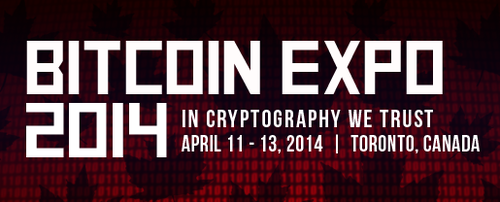Bitcoin Expo speaker, Jason King, explains Bitcoin Across America.
Click here for Jason’s bio.
Bitcoin Expo speaker, Jason King, explains Bitcoin Across America.
Click here for Jason’s bio.
Bitcoin Expo speaker, David F. Bailey, talks to CoinTalk at the Inside Bitcoins Conference Las Vegas.
Click here for David’s full bio.
Bitcoin Expo speaker, Tatiana Moroz, singing “The Bitcoin Song” at the LaBitConf 2013, the first Latin American Bitcoin conference!
Click here for Tatiana’s full bio.
Bitcoin Decentral is a proud exhibitor at Canada’s first Bitcoin Expo happening at the Metro Toronto Convention Centre next week.
Our team will be present at Bitcoin Decentral’s booth to introduce you to our new coworking space and take applications for the accelerator program. We may even bring the BTM with us!
We’ll be hosting a Hackathon on April 10th, the day before the Expo starts, so if you’re interested in participating, click here to reserve your spot.
Bitcoin Expo 2014 will also be a great opportunity to get to know some amazing people behind Bitcoin Decentral Accelerate. Fifteen of our mentors will be speaking at the conference! Many of them live outside of Canada, so if it wasn’t for this event, we’d only ever meet them via Skype.
So, have you bought your tickets yet? They’re going fast! Please visit www.bitcoinexpo.ca to register now and take a look at the program.
See you soon!

BDA Mentor Brock Pierce on why he thinks Bitcoin will be more revolutionary than the Internet.
BDA Mentor, Andreas Antonopoulos, on the Joe Rogan Experience podcast.
This blog post looks at the issue of whether sellers of bitcoins need to charge HST. It was written by Addison Cameron-Huff, a lawyer who specializes in Bitcoin. Tax is a complex area and you should seek accounting/legal advice before acting.
Most stores in Ontario that sell goods are required to charge 13% HST. According to the CRA:
“Almost everyone has to pay the GST/HST on purchases of taxable supplies of property and services (other than zero-rated supplies). A limited number of sales or supplies are exempt from GST/HST.”
One transaction that is exempt from HST is the sale of “gift certificates”, as provided for in s. 181.2 of the Excise Tax Act:
“… the issuance or sale of a gift certificate for consideration shall be deemed not to be a supply and, when given as consideration for a supply of property or a service, the gift certificate shall be deemed to be money.”
The Excise Tax Act does not define “gift certificate” but in 2012 the CRA issued a policy statement that explains their view on what a gift certificate is. The CRA’s definition of gift certificate requires the following five attributes:
“1. It has a monetary exchange value that is evident on the certificate or that is easily determined by the parties involved in the transaction. The monetary exchange value may, for example, be specified on the face of the certificate or it may be stored on the certificate electronically. In certain cases, the customer may be permitted to add additional amounts to the monetary exchange value of the certificate. Alternatively, the gift certificate may be for a particular supply of property or a service that is identified on the certificate.
- It is issued or sold for consideration by the supplier of the property or service or another party for use at a particular supplier. The consideration paid for the certificate may not necessarily be the same as the monetary exchange value.
- It is accepted as payment or partial payment of the consideration for a supply of property or a service offered by the supplier of that property or service.
- It does not require the bearer to do anything to redeem the certificate other than to present it as a means of payment or partial payment for the property or services being acquired. The holder of the certificate should not be required to meet other conditions, such as, making a purchase of a particular value (i.e., a required minimum value) or purchasing one item to exchange the gift certificate for another item (e.g., buy one, get one free) in order to redeem the certificate.
- It does not have any intrinsic value. The certificate should not have any value other than its monetary exchange value.”
In addition to the CRA’s policy statement there is case law that helps to explain what “gift certificate” means in Canadian law such as Royal Bank of Canada v. The Queen, 2007 TCC 281.
There are severe penalties for failing to comply with tax obligations. A seller of goods who fails to charge HST could be liable for the entire amount that should have been charged (with interest and penalties) and, if the seller is a corporation, liability may extend to the director(s).
It is possible to request from the CRA a tax ruling or interpretation regarding HST obligations: http://www.cra-arc.gc.ca/E/pub/gp/rc4405/rc4405-e.html, but this please note that interacting with the CRA may result in negative tax consequences. You are strongly advised to seek the advice of a tax professional before starting to sell bitcoins or charging/not charging HST.